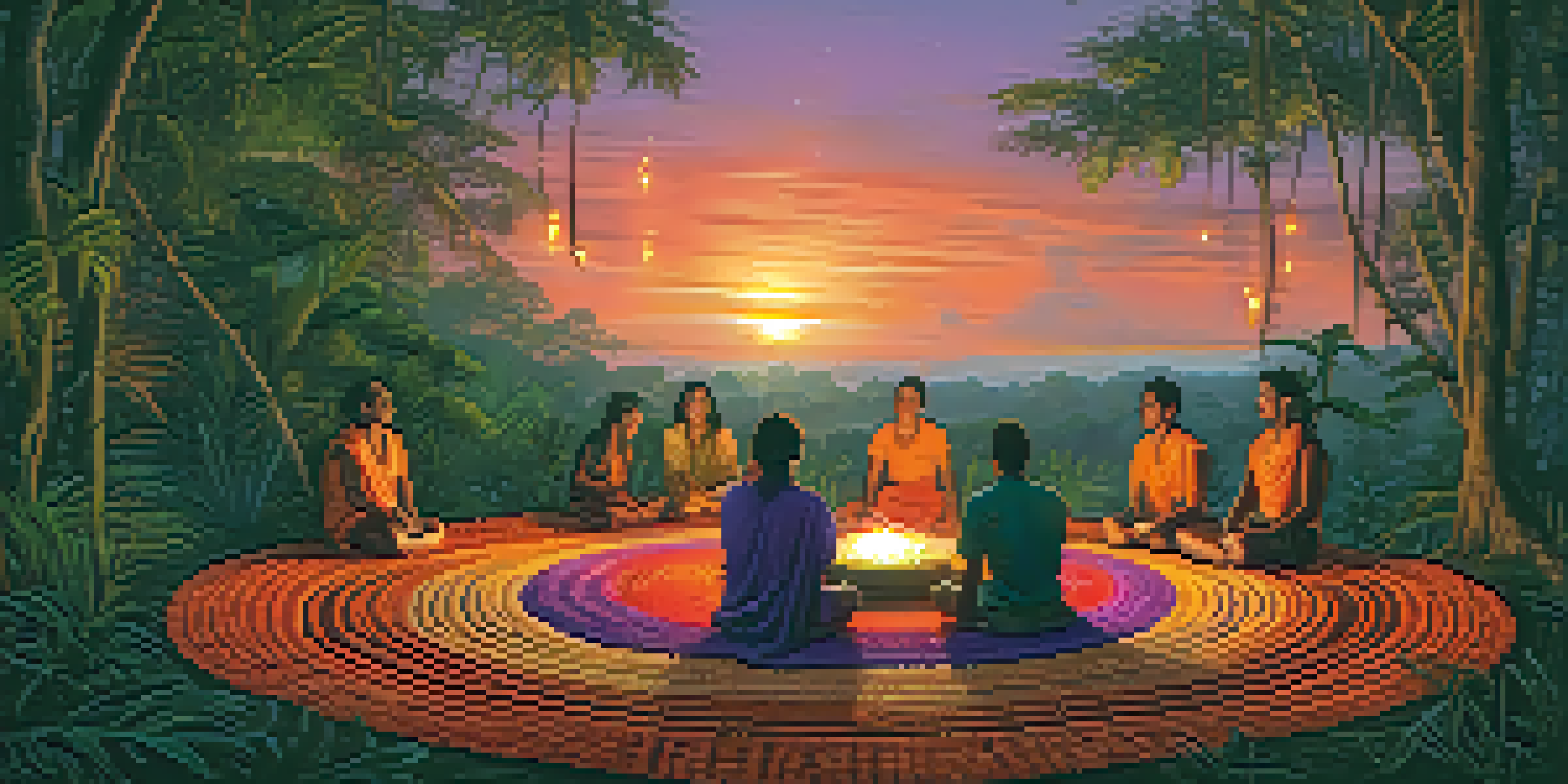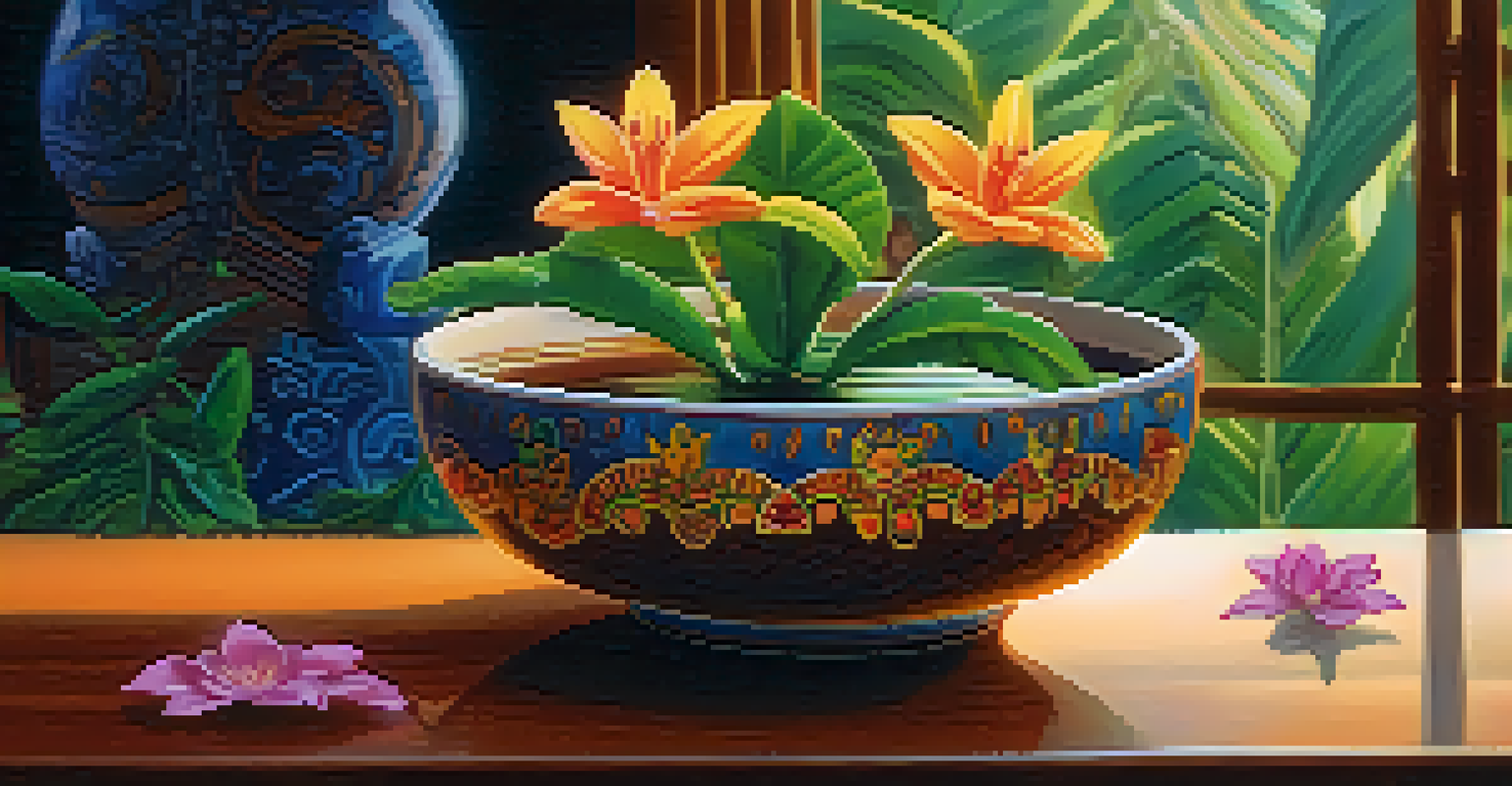The Role of Ayahuasca in Community Healing Practices Today

Understanding Ayahuasca: A Brief Overview
Ayahuasca is a powerful plant medicine traditionally used by indigenous communities in the Amazon. It is made from the Ayahuasca vine and other plants, creating a brew that induces altered states of consciousness. This experience can lead to profound insights and emotional healing, making it a cornerstone of various spiritual practices.
The experience of Ayahuasca is not just a journey inward, but a journey that connects you to the world and people around you.
In recent years, Ayahuasca has gained popularity beyond its traditional roots, attracting individuals seeking healing and personal growth. Many people report transformative experiences, often describing a sense of connection to themselves and the world around them. This shift has sparked a broader interest in understanding how Ayahuasca can benefit community healing.
It's essential to recognize that while Ayahuasca can offer healing, it is not a panacea. The experiences are deeply personal and can vary widely among individuals. Understanding its cultural significance and the context in which it is used is crucial for anyone considering this journey.
The Cultural Significance of Ayahuasca
For centuries, Ayahuasca has been integral to the spiritual practices of various Amazonian tribes. It is often used in ceremonies led by shamans, who guide participants through their journeys. These gatherings foster a sense of community and shared experience, emphasizing the importance of collective healing.

The rituals surrounding Ayahuasca are rich in cultural symbolism and tradition, reflecting the beliefs and values of the communities that use them. Participants often engage in songs, prayers, and other forms of expression, creating a profound atmosphere of connection. This cultural framework plays a significant role in the healing process.
Ayahuasca's Healing Potential
Ayahuasca offers profound emotional insights and healing, especially for those seeking personal growth.
As Ayahuasca spreads globally, there’s a risk of cultural appropriation, where the practices are taken out of context. It's vital to approach Ayahuasca with respect for its origins, recognizing the teachings of indigenous healers and the significance of their traditions.
Ayahuasca and Mental Health: A Growing Interest
Recent studies have begun to explore the potential benefits of Ayahuasca for mental health conditions, such as depression and PTSD. Participants in these studies often report significant reductions in symptoms and improved emotional resilience. This scientific interest reflects a growing recognition of alternative healing practices.
Integration is the bridge between the insights gained during the experience and the practical changes we make in our daily lives.
The experiences induced by Ayahuasca can facilitate deep emotional release and introspection, allowing individuals to confront trauma and unresolved feelings. Many participants describe a sense of clarity and newfound perspective after their journeys. This therapeutic aspect highlights its potential as a complementary approach to traditional mental health treatments.
However, it’s essential to approach these findings with caution. While Ayahuasca shows promise, more rigorous research is needed to fully understand its effects and safety. Those interested should consult professionals and consider their personal mental health histories.
Community Healing: The Role of Group Ceremonies
Group ceremonies play a significant role in the healing process when using Ayahuasca. These gatherings create a supportive environment where individuals can share their experiences and emotions. This sense of community can enhance the healing journey, providing a space for connection and understanding.
During group ceremonies, participants often find strength in witnessing one another's journeys. The shared experience fosters empathy and solidarity, breaking down barriers of isolation that many feel. This communal aspect is vital, as healing is often more profound when shared with others.
Cultural Context is Crucial
Understanding the cultural significance of Ayahuasca is essential to respect its traditional roots and practices.
Moreover, group dynamics can influence the overall atmosphere of the ceremony. A positive, respectful environment can lead to deeper insights and more meaningful experiences. Facilitators play a crucial role in maintaining this atmosphere, ensuring that everyone feels safe and supported.
Integration: Making Sense of the Experience
Integration is a crucial step following an Ayahuasca ceremony, as it involves making sense of the insights gained during the experience. Participants are encouraged to reflect on their journeys, often journaling or discussing their experiences with others. This process helps translate the insights into meaningful changes in daily life.
Many communities offer integration circles or support groups, where individuals can share their experiences and learn from one another. This ongoing dialogue reinforces the sense of community and provides a platform for healing beyond the ceremony itself. It creates a space for accountability and encouragement.
Effective integration can lead to lasting personal transformation, helping individuals develop healthier coping mechanisms and deeper self-awareness. By fostering these discussions, communities can ensure that the benefits of Ayahuasca extend beyond the initial experience.
Challenges and Risks of Ayahuasca Use
While Ayahuasca can offer profound healing, it is not without risks. The intense nature of the experience can be overwhelming for some, potentially triggering anxiety or distress. Those with certain mental health conditions, particularly psychosis, should approach with caution and seek professional guidance.
Additionally, the increasing popularity of Ayahuasca has led to a rise in poorly organized or commercialized ceremonies. Not all facilitators have the necessary training or experience, which can compromise the safety and integrity of the experience. It’s vital for individuals to do their research and choose reputable practitioners.
Integration is Key Post-Ceremony
Effective integration of Ayahuasca experiences into daily life fosters lasting personal transformation and accountability.
Being aware of these challenges can empower individuals to make informed decisions about their Ayahuasca journeys. Understanding both the potential benefits and risks is essential for anyone considering this path toward healing.
The Future of Ayahuasca in Community Healing
As interest in Ayahuasca continues to grow, its role in community healing will likely evolve. Many practitioners are working to bridge traditional practices with modern therapeutic approaches, creating hybrid models that respect cultural roots while addressing contemporary needs. This approach can enhance the healing potential for diverse populations.
Moreover, increased awareness of mental health issues has opened doors for alternative therapies like Ayahuasca to be taken seriously within broader healthcare discussions. As more research emerges, it may become integrated into mainstream mental health care, offering new avenues for healing.

Ultimately, the future of Ayahuasca in community healing will depend on a respectful and informed approach. By honoring its cultural significance and prioritizing safety and well-being, Ayahuasca can continue to be a source of healing for many.